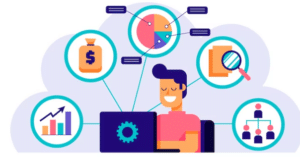blog.hargaticket.com – Customer Relationship Management Defined – In an era defined by connectivity, digital transformation, and ever-evolving consumer expectations, Customer Relationship Management (CRM) has become a pivotal strategy for businesses of all sizes and industries. It is the art and science of building and nurturing relationships with customers through data-driven insights, personalized interactions, and seamless experiences. This article will delve deep into the realm of CRM, exploring its definition, evolution, crucial components, real-world applications, and how it unites businesses and customers in the digital age.
The Essence of CRM
Defining CRM
At its essence, CRM is a multifaceted approach that combines technology, strategy, and processes to manage and improve interactions with customers. It involves the collection, analysis, and utilization of customer data to understand their needs, preferences, and behaviors. CRM is not merely a software system but a comprehensive philosophy that places the customer at the center of business operations.

The Evolution of CRM
CRM has evolved significantly since its inception. Initially, it was focused on managing customer information, primarily contact details and interactions. However, with the advent of digital technology, the role of CRM has expanded to encompass a wide range of functionalities, including sales automation, marketing automation, and customer service management.
Key Components of CRM
Data Integration
Central to CRM is data integration. Modern CRM systems aggregate data from various sources, such as email communications, social media interactions, and purchase histories, creating a unified customer profile. This 360-degree view of the customer allows businesses to provide personalized experiences.
Personalization
Personalization is a cornerstone of effective CRM. By leveraging customer data, businesses can tailor their communications, product recommendations, and marketing messages to individual preferences, fostering deeper connections and increasing customer loyalty.
Process Automation
Automation is a critical feature of CRM. It streamlines repetitive tasks like data entry, lead nurturing, and follow-up communications. This automation enhances efficiency and frees up resources for more strategic activities.
Analytics and Insights
Advanced CRM systems offer robust analytics and insights capabilities. They analyze customer data to provide actionable information that guides decision-making, identifies trends, and refines strategies. This data-driven approach is instrumental in optimizing customer relationships.
CRM in Action
Improved Customer Understanding
CRM empowers businesses to gain a deep understanding of their customers. By analyzing data, organizations can uncover trends, preferences, and pain points, which in turn informs decision-making and strategy development.
Enhanced Customer Engagement
The personalized interactions and contextually relevant experiences made possible by CRM systems lead to improved customer engagement. Businesses can communicate with customers at the right time, with the right message, and through the right channels.
Streamlined Operations
Automation in CRM streamlines operations, reducing manual effort and increasing efficiency. This results in cost savings and allows employees to focus on higher-value tasks.
Increased Revenue
The combination of personalized engagement and streamlined sales processes has a direct impact on revenue. CRM helps businesses convert leads into customers more effectively and encourages repeat business through personalized offers and recommendations.
CRM Across Industries
E-commerce and Retail
In the e-commerce and retail sectors, CRM systems enable businesses to create personalized shopping experiences. Customer data informs product recommendations, discounts, and loyalty programs, enhancing customer satisfaction and loyalty.
Financial Services
Financial institutions leverage CRM to manage client relationships effectively. Personalized financial advice, investment recommendations, and account management are all facilitated by CRM systems, leading to increased client satisfaction.
Healthcare
In healthcare, CRM systems streamline patient management. They ensure timely follow-ups, personalized care plans, and effective communication among healthcare professionals, ultimately improving patient outcomes.
Challenges and Considerations
Data Privacy and Security
As CRM systems handle sensitive customer data, ensuring data privacy and security is paramount. Businesses must adhere to data protection regulations and implement robust security measures to safeguard customer information.
Integration and Adoption
Integrating CRM systems with existing technology infrastructure and ensuring user adoption can be complex. Effective change management, training strategies, and a well-defined implementation plan are essential for success.
The Future of CRM
AI-Powered Predictive Analytics
The integration of artificial intelligence (AI) and machine learning will continue to advance CRM capabilities. Predictive analytics will enable businesses to anticipate customer behavior and needs more accurately.
Voice and Conversational Interfaces
Voice technology and conversational interfaces will play a more significant role in CRM interactions. Customers will engage with CRM systems through voice-activated devices and chatbots, enhancing convenience and engagement.
Conclusion
Customer Relationship Management is no longer a business buzzword; it’s a fundamental strategy that defines how businesses interact with their customers. In an age of digital transformation, where data and personalization are paramount, CRM is the glue that unites businesses and customers in meaningful relationships.
The impact of CRM on businesses is profound, from improved customer understanding to enhanced engagement and increased revenue. As technology continues to evolve, the future of CRM promises even more advanced capabilities, driven by artificial intelligence and conversational interfaces. Businesses that embrace CRM are poised to thrive in a customer-centric digital age, where meaningful connections are the key to success. CRM is the bridge that brings businesses and customers closer together, forging lasting and mutually beneficial relationships.